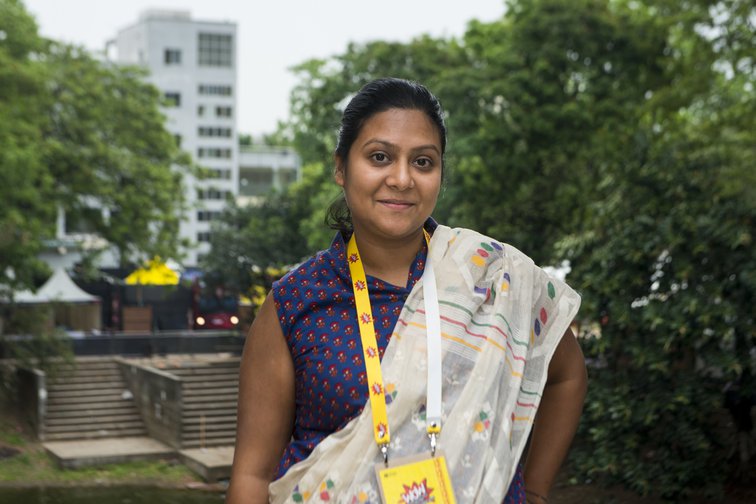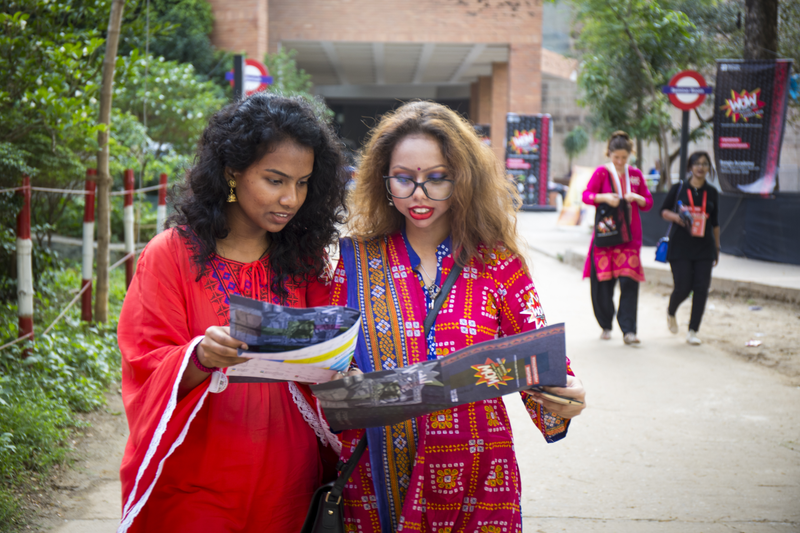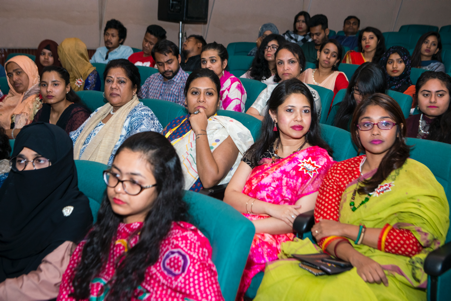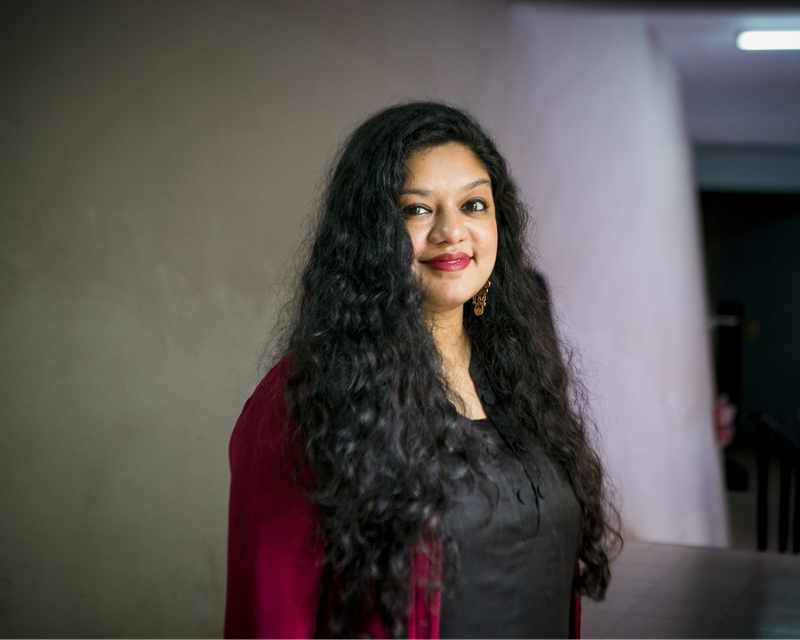Human Wrongs Watch
On Dhaka’s streets and stages, women tell their stories – about issues from violence to sexuality to working conditions. And they demand to be heard.

6 May 2019 (openDemocracy)* — Tassafy Hossain is smiling broadly when we meet backstage at the feminist arts festival Women of the World (WOW) in Dhaka in March. She talks with enthusiasm about the packed programme that she co-curated, including theatre performances featuring disabled actors, and talks from leading women’s rights activists in Bangladesh.
Founded in London in 2010, WOW festivals have taken place all over the world, including in Pakistan, Brazil, and the US. This year, the festival came to Bangladesh’s capital city for the first time, in partnership with the British Council.
Hossain is determined to unravel gender stereotypes and build platforms where women can speak about their lives and experiences of everything from sex, relationships and abuse, to modesty and clothing. As a young woman in 2010, she founded her theatre group Bonhishikha (Unlearn Gender).
The theatre-maker tells me she started out by organising a production of the US feminist Eve Ensler’s classic 1996 play The Vagina Monologues: a series of episodes in which women discuss their bodies, sexuality and experiences of male violence.
“In 2013 we decided to do a local context version of the monologues”, Hossain says, explaining how she started to gather stories from local women in her community to perform on stage. “That got us started on creating our own version of it. It took on its own life so now we do our own collection of stories from women and some from men”.
All of these contributions are anonymously worked into the shows which are performed around Dhaka a few times a year.
Backstage at the WOW festival she tells me: “The first year there were a lot of stories about domestic violence. Street harassment. Child abuse. Now people are also talking more about emotional abuse. Through these conversations, you realise how common and normal it is”.
Sharing stories can help women understand different forms of abuse, Hossain continues, including “being restricted from doing activities, and never being given an opportunity to do or try certain things. For women to realise this is abuse takes a long time, and an even longer time to be comfortable talking about it”.
“Sharing stories can help women understand different forms of abuse”

Hossain also encourages women to share stories about their sex lives in order to “create a positive narrative about female sexuality”. This started, she says, by “asking people what they liked, because we didn’t want the whole production to be all abuse and pain and hurt!”
She describes the particular challenge of “trying to find people’s examples of extra-marital sex – everyone completely denies it existing. I wanted to find out where people went to have sex when they weren’t married and include these stories in a show”.
“Asking this question was an interesting experience!” she exclaims. Many people were initially sceptical about answering these queries, but some did open up and share their stories as “so often women don’t have that space”.
“I wanted to find out where people went to have sex when they weren’t married and include these stories in a show”
More men are coming forward with their stories as well. Hossain hopes this will lead to a mixed show that will explore “sexuality, child abuse, gender roles, and dating”.
She represents a new generation of young women theatre-makers taking to the stage to challenge gender stereotypes and provide platforms for women’s voices.
But using theatre to change hearts and minds is not new to Dhaka. Hossain’s WOW festival colleague Sara Zaker tellsme she’s also been resisting Bangladesh’s patriarchal society through drama since its war of independence from Pakistan in 1971.
In between introducing panels and performances, Zaker sits down with me backstage to tell me about her long career that spans acting, producing, adapting plays, and television appearances. She speaks quietly, but with a steely determination to promote theatre as a means to have challenging conversations and tackle social issues.
The “theatre world” was also “a kind of patriarchy”, she tells me. “Where the playwright is a guy, the director is a guy, and the woman is the diva. Things back then did disturb me. Women were acting the roles, but when it came to making the decisions – it was the guys”.
Now, Zaker runs her own theatre group, Nagorik Natya Sampradaya. It stages plays that “are very much rooted in the man and woman dynamic, how unequal it is”.
“Theatre is an art form and an art form allows you space. It allows people to think for themselves”, Zakar continues. “People think that audiences aren’t ready to accept certain things. But I believe audiences are really very mature and they are ready”.

While Hossain and Zakar use theatre to challenge gender stereotypes, Elita Karim fights for equality through her writing and music. At the WOW festival, Karim takes to the stage with celebrated musician Armeen Musa, alongside a host of other women vocalists.
She recently recorded a song with other women artists to celebrate the young players in the 2019 Bangamata under-19 women’s international football tournament, which aims to encourage girls to play outside – something they can be restricted from in Bangladesh.
“We want girls to come out just like the boys do after school”, Karim tells me. “Getting out of the home in the evening, and playing in the playground, is still considered taboo for women”.
Sitting in a corner tucked behind the main auditorium in the cultural centre Bangla Academy where inside wheelchair-using actors perform an original theatre piece, the two of us discuss the barriers and stigmas women and girls face to have independent, creative careers.
It’s a stigma Karim understands from her own experience of being a creative woman in Dhaka. “A girl staying out late because she is recording an album or rehearsing a play or writing to a deadline; this is still considered radical in many parts of the country”, she says.
“A girl staying out late because she is recording an album or rehearsing a play or writing to a deadline; this is still considered radical”
Promoting women’s right to public space is a key theme for Karim. Another of her songs explores a girl who wants to ride a bike, go for walks, and climb the hills behind her house.
“Writing helps, definitely”, she says, when I ask if her work is useful in tackling political issues. “But I also think in this country and in this city, you need to do more than sit around writing. You need to get your hands dirty. That’s why I am going out and meeting girls, talking to women, to understand their issues. I cannot just sit behind the computer”.

One group getting outside is BotTala which stages street performances about sexual harassment, the silencing of women, and the treatment of garment workers.
BotTala’s Samina Luthfa wrote her first play about garment workers’ rights following a fire at the Tazreen Garment factory in 2012 that killed 126 people. The play premiered on 14 April 2013. Ten days later the Rana Plaza factory collapsed, killing 1,134 people, and the need to expose the poor treatment of garment workers became even more urgent.
“All the writers are women who are working in the ready-made garment sector”
“We decided we were going to raise awareness in the area where Rana Plaza was happening”, Luthfa explains. “We did 25 shows in the area so that later on we could organise protests of labourers and workers and tell the world about how badly the workers are treated in Bangladesh while producing clothes for the global market”.
Luthfa believes that theatre shouldn’t be “art for art’s sake. It’s for changing things”. This philosophy is also reflected in BotTala’s newest piece, currently being developed in collaboration with women garment workers about their limited access to clean water.
The workers themselves are at the heart of the development process and attend a writing club where they tell their stories – challenging the idea that theatre is only for the elite. Rather, Luthfa’s work shows that women from all classes can use drama to speak out.
“All the writers are women who are working in the ready-made garment sector. Many of them cannot write so we gave them cell phones to record their stories”, she explains.
As with Hossain’s work with her theatre group Bonhishikha, Luthfa says that for many of the women involved in this project, it’s their first opportunity to share their experiences.
“Thirteen of the women in the club are helpers and operators”, Luthfa says, referencing the lowest paid and lowest status workers in the factories. “There is no one who will listen to their stories. A few women started to cry when they shared what had happened to them”.
And, she adds: “They feel there is a sisterhood who is there to listen to them”.
*Sian’s travel and accommodation in Dhaka was supported by the British Council.
Leave a comment